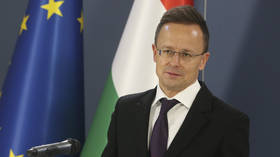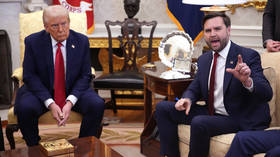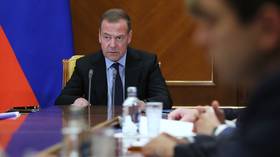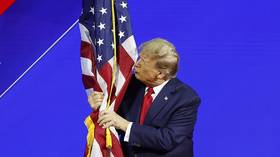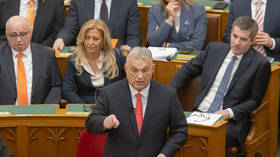Trump signs Russia sanctions bill despite ‘clearly unconstitutional’ provisions
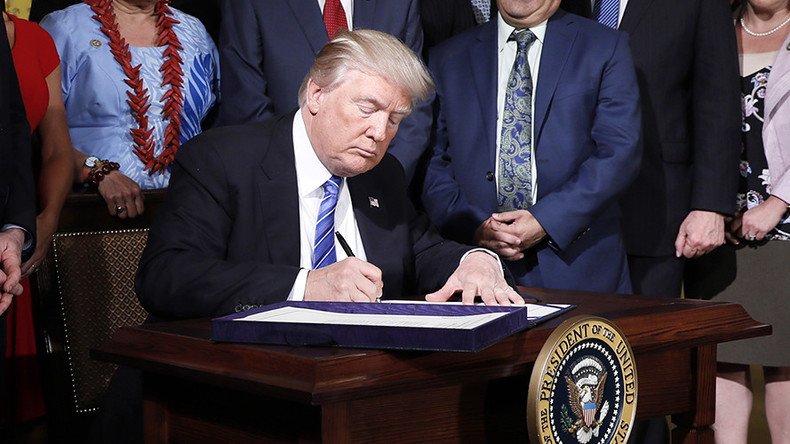
US President Donald Trump has signed legislation that imposes new sanctions against Russia, Iran and North Korea and limits his ability to ease sanctions without approval from Congress.
In a statement on Wednesday, Trump said he signed the ‘Countering American Adversaries Through Sanctions Act,’ even though it was “seriously flawed” and had “clearly unconstitutional provisions” that encroach on the executive branch’s authority to negotiate foreign policy.
“Congress could not even negotiate a healthcare bill after seven years of talking,” the president stated. “By limiting the Executive’s flexibility this bill makes it harder for the United States to strike good deals for the American people, and will drive China, Russia, North Korea much closer together.”
BREAKING: Moscow ‘won’t bend or break’ over US sanctions – Russian envoy to UN https://t.co/iXAaGhR7JNpic.twitter.com/jpdz9fTQn6
— RT (@RT_com) August 2, 2017
Despite the concerns, Trump signed the legislation “for the sake of national unity,” says a statement released by the White House.
The sanctions bill “represents the will of the American people to see Russia take steps to improve relations with the United States,” Trump added, echoing the statement made by the State Department last week.
Vote in Congress for sanctions legislation represents will of Americans to see #Russia improve relations w/ the U.S. https://t.co/wVVUOJxqqg
— Department of State (@StateDept) July 29, 2017
“The US President’s signing of the package of new Russia sanctions ends hopes for improving our relations,” said Russian Prime Minister Dmitry Medvedev.
The US President's signing of the package of new Russia sanctions ends hopes for improving our relations https://t.co/UizYaTbSR6
— Dmitry Medvedev (@MedvedevRussiaE) August 2, 2017
The Trump administration has shown its total weakness by handing over executive power to Congress in the most humiliating way
— Dmitry Medvedev (@MedvedevRussiaE) August 2, 2017
“The Deep State, the Neocons, and the media are very powerful, and they’ve ganged up on Trump,” said libertarian former congressman Ron Paul, in an interview with RT. “In the long run this bill doesn’t benefit Trump, it doesn’t benefit America, it doesn’t benefit peace in the world.”
On Wednesday, Trump also said he supports “making clear that America will not tolerate interference in our democratic process, and that we will side with our allies and friends against Russian subversion and destabilization.”
Trump had previously repeatedly expressed doubts about Russia’s alleged interference in the US presidential election, which is one of the things the bill cites as grounds for imposing the additional sanctions on Moscow.
Earlier, both Chambers of the US Congress voted with veto-proof majorities to approve the bill which seeks to punish Russia over a host of issues, including its support for the Syrian government, alleged support for the rebels in Ukraine, as well as Crimea’s accession to Russia. The US considers the latter illegal even though residents of Crimea had overwhelmingly voted for the reunification in a referendum three years ago.
The sanctions target a wide array of entities and individuals – including Russia’s energy sector, banks, weapons manufacturers as well as those whom the US has accused of interfering in the presidential election through hacking and otherwise.
To reverse each of the sanctions, the administration would have to provide evidence and certify that the conditions that prompted them have been removed.
“It empowers Congress to review and disapprove of any sanctions relief,” said Representative Ed Royce (R-California) on the House floor ahead of the vote on July 25.
Berlin calls for retaliation against 'illegal' US sanctions on Russia https://t.co/AtZTAk3BGspic.twitter.com/xBGnNBwFkg
— RT (@RT_com) August 1, 2017
Moscow responded to the bill’s passage in Congress by retaliating for the US expulsion of Russian diplomats and closure of two properties, ordered by the outgoing President Barack Obama in December 2016. Two US diplomatic properties in Russia were locked down, while the US embassy was told to reduce its staff to the level of the Russian embassy in the US, requiring Washington to pull out 755 embassy employees.
The new sanctions have been criticized by a number of senior politicians in Europe, including the Austrian Chancellor Christian Kern and German Foreign Minister Sigmar Gabriel. They argue the sanctions could affect European energy security and serve Washington’s economic interests – in line with Trump’s stated “America First” foreign policy.
“We deem it absolutely unacceptable when a bill demands that Europeans give up on Russian gas so that they could sell American instead, at a much higher price,” Gabriel said.
Russian energy giant Gazprom currently supplies a third of European gas demands, having delivered a record 179 billion cubic meters (bcm) of natural gas to Europe in 2016. Construction of additional delivery infrastructure would diversify the supply of Russian gas and make its delivery cheaper.
Trump said on Wednesday that the language of the bill “regarding the energy sanctions provided for in the legislation” was “improved” to reflect feedback from the EU. It was not immediately clear exactly what improvements have been made.



